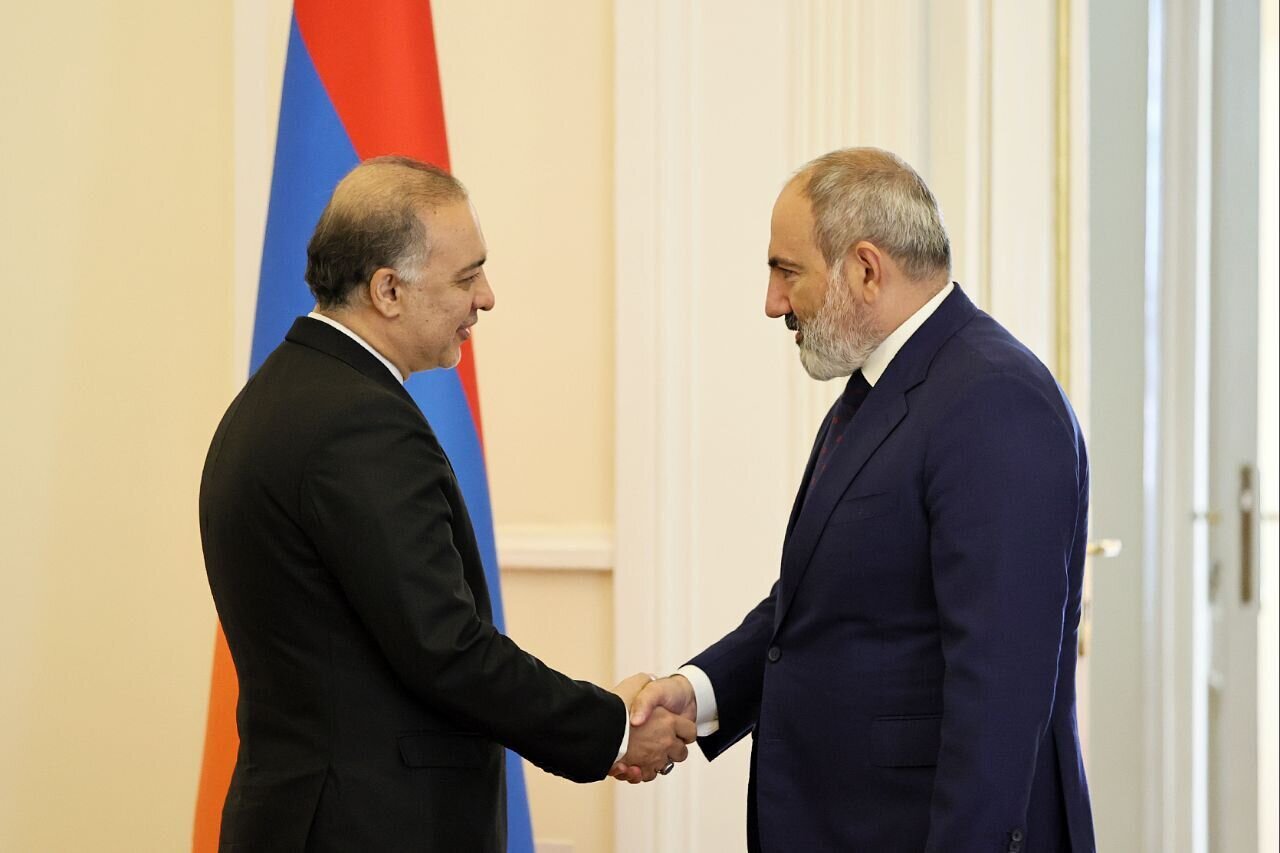Armenian PM backs dialogue with Iran amid conflict in Karabagh

TEHRAN- Under the current volatile situation in Nagorno-Karabakh, Armenian Prime Minister Nikol Pashinyan on Monday emphasized the importance of “active communication” between Yerevan and Tehran.
Pashinyan made the statement during a meeting with Iran’s new ambassador to Yerevan, Mehdi Sobhani.
According to a news statement from his office, Pashinyan noted that his “reliable dialogue” with Iranian President Ebrahim Raisi lays the ground for the steady improvement of bilateral cooperation.
He also congratulated Sobhani on his new position, expressing optimism that bilateral ties will continue to flourish throughout his diplomatic tenure in Armenia.
Sobhani, for his part, reiterated Iran’s unambiguous support for Armenia’s territorial integrity.
He voiced worry over the humanitarian situation in the disputed Nagorno-Karabakh territory, stating that the safety and rights of Armenians residing there must be ensured.
The Iranian envoy went on to say that the Islamic Republic is eager to expand relations with Armenia in all areas.
In the Caucasus region of Nagorno-Karabakh, which is inside Azerbaijan, the majority of the population is of ethnic Armenian descent.
Following the most recent armed clashes with Azeri forces, Armenian authorities, who have been in charge of the region's affairs without receiving international recognition since the early 1990s, declared on Wednesday that local “self-defense forces” had disbanded and laid down their weapons as part of a ceasefire mediated by Russia.
The ceasefire put an end to Azerbaijan’s 24-hour war in the enclave.
On Thursday, representatives from Azerbaijan and Karabakh separatists began their first direct peace negotiations in the city of Yevlakh as Baku claimed complete authority over the region.
Iran has repeatedly urged Armenia and Azerbaijan to reach a peaceful resolution to their conflict over the Nagorno-Karabakh territory.
On Friday, Iranian President Ebrahim Raisi underlined the need for the Republic of Azerbaijan to ensure the rights of ethnic Armenians in the Karabakh region.
Speaking at a military parade in Tehran, President Raisi reiterated Iran’s position on the situation in the South Caucasus region.
“The powerful Iranian armed forces are present in the region to prevent any change in the geopolitics of the region and changes in the borders, and they have been successful in this,” he asserted.
Raisi added, “Regarding the developments in the [South Caucasus] region, we emphasize that preserving the rights of Armenians and observing the situation of Armenians is a necessity, in such a way that the security and rights of Armenians must be protected in the region and the state of the borders must be completely preserved.”
According to CNBC, thousands of ethnic Armenians on Tuesday fled their homes in the breakaway enclave of Nagorno-Karabakh.
The mass exodus comes after the lightning military operation by Azerbaijan that saw it take full control of the region that has endured more than three decades of conflict.
The 24-hour offensive ratcheted up fears of major unrest throughout the Caucasus — the border region between southeast Europe and west Asia.
The landlocked territory of Nagorno-Karabakh declared independence from Azerbaijan in 1991 and, with the support of Armenia, has fought two wars with Azerbaijan in the space of 30 years. The territory is currently home to an estimated 120,000 ethnic Armenians.
Hundreds of cars, buses and open-top trucks were seen Tuesday snaking their way through the last Azerbaijani checkpoint to enter Armenia via the so-called Lachin Corridor, a mountain road that connects Armenia and Nagorno-Karabakh.
The first convoys of civilians leaving the region began on Sunday. As of Tuesday morning, at least 13,350 people were estimated to have entered Armenia from Nagorno-Karabakh, according to the Armenian government.
Armenia said Azerbaijan’s military operation last week was an attempt to ethnically cleanse Nagorno-Karabakh, a charge it denies.
Speaking on Sunday in an address to the nation, Armenia’s prime minister said the likelihood was rising that people would seek to flee the Nagorno-Karabakh region “as the only way to save their lives and identity,” Reuters reported.
“Responsibility for such a development of events will fall entirely on Azerbaijan, which adopted a policy of ethnic cleansing, and on the Russian peacekeeping contingent in Nagorno-Karabakh,” Pashinyan said. He added that the government’s strategic partnership with Moscow was not enough to protect the country’s external security.
